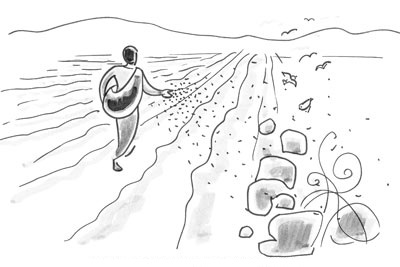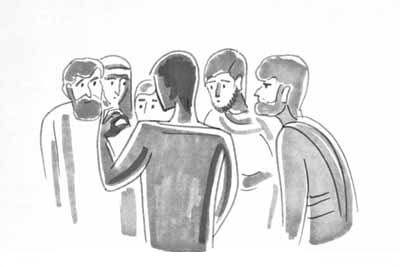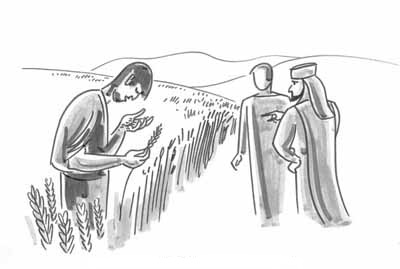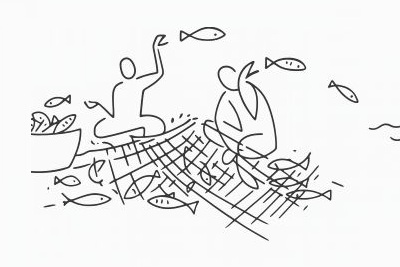The Kingdom of God
The Kingdom of God is the central, foundational principle of Jesus' teaching and His entire ministry. It does not primarily refer to a geographical place, but rather to the active, sovereign reign of God. These parables were not merely moral lessons; they were invitations to see and respond to a hidden reality breaking into the world. This idea challenged common Jewish expectations of a purely political, earthly Kingdom that would violently overthrow Roman rule. Jesus described the Kingdom as a spiritual realm where God reigns in the hearts of people who respond to His call.
Through parables like the Sower, Mustard Seed, Leaven and the Hidden Treasure, Jesus taught that the Kingdom often begins in small, unseen ways but grows powerfully and transforms everything it touches. Others, like the Wheat and Tares or Fishing Net, reveal a future reckoning and the call to discernment and faithfulness. These stories challenge us as hearers to examine our hearts and recognize the surprising, often upside-down way God's rule manifests. Understanding these parables deepens our understanding of God's redemptive mission and invites us into a life of radical trust, transformation and participation in His unfolding Kingdom.
The Sower and the Seed
Scripture Reference Matt 13:1-23, Mark 4:1-20, Luke 8:4-15
Among the parables Jesus told, few are as foundational and illuminating as the Parable of the Sower. This parable provides a vivid picture of how the Word of God, the incorruptible seed (1 Pet 1:23), interacts with the varied conditions of the human heart. Jesus Himself emphasized its importance when He told His disciples, 'Do you not understand this parable? How then will you understand all the other parables?' (Mark 4:13). In other words, this parable is a gateway to understanding how the Kingdom of God operates.
Jesus told of a sower who went out to scatter seed. In that agricultural society, sowing by hand was a common sight - a farmer would cast seed broadly and it would inevitably land on different types of ground. The soil represents the human heart, which is central in this teaching; and the fruitfulness of the seed is determined by the heart's response. Unlike earthly seeds, which decay or fail; the Word of God is incorruptible, eternal, pure and unchanging. It always contains within it the power to bring forth life, growth and fruitfulness. The problem never lies in the seed, but in the receptivity of the soil - the heart of the hearer.

Parable of the Sower and the Seed
Illustration by Annie Vallotton, from the Good News Bible. Image courtesy of Rotation.org
The Hardened Heart
Jesus explained that the seed falling on the wayside path represents those who hear the Word, but immediately the enemy comes and snatches it away (Matt 13:19). The wayside is ground that has been trampled on repeatedly, becoming packed down and resistant.
This reflects a heart hardened by sin, pride, unbelief or repeated rejection of God's truth. Though the Word is proclaimed, it never penetrates. Instead, it lies exposed on the surface, where spiritual forces snatch it away before it can take root. Hebrews 3:15 warns: 'Today, if you will hear His voice, do not harden your hearts as in the rebellion'. Such a heart needs breaking, softening and plowing by repentance and humility, so that the incorruptible seed can enter.
The Shallow Heart
The seed on rocky ground springs up quickly because the soil is shallow, but withers when the sun rises, as it has no root. Jesus explained that this represents those who hear the Word and receive it with joy, but fall away when trials, persecution or hardship come because they have no depth (Mark 4:16-17).
This describes a heart that responds emotionally to God's Word but lacks commitment and endurance. The Word excites them in the moment, but without roots of faith and character, the life of God withers under pressure. Depth is cultivated through prayer, obedience and allowing the Spirit of God to form Christlike endurance in us. The shallow heart must invite God to remove the hidden stones - selfish ambition, fear of man or unwillingness to endure trials - so that the seed can take deep root.
The Divided Heart
The thorny ground produces growth, but the seed is choked by thorn - the cares of this world, the deceitfulness of riches and the pleasures of life (Luke 8:14). The Word is present, but competing loves and desires overwhelm it, leaving the plant unfruitful.
This is the divided heart, trying to serve both God and the world. While the Word germinates, its life is suffocated by distraction, anxiety or misplaced priorities. Jesus warned, 'You cannot serve God and mammon' (Matt 6:24). A divided heart is perhaps the most common in our modern age of distraction, consumerism and busyness. The seed of God's Word cannot thrive in a heart choked with worldly attachments. Fruitfulness requires a single-minded devotion to God, seeking first His Kingdom (Matt 6:33).
The Receptive Heart
Finally, Jesus described the good soil - hearts that hear the Word, accept it and bear fruit - thirtyfold, sixtyfold or a hundredfold. This soil is soft, deep and free of competing weeds. It represents a heart that is receptive, obedient and steadfast.
The good soil is not naturally occurring - it is prepared. Just as a farmer tills, removes rocks and uproots thorns, so the Spirit of God works in us to prepare our hearts. A receptive heart values the Word, meditates on it and allows it to transform thought, desire and behavior. The harvest is inevitable when the incorruptible seed is planted in such soil. The fruit is not only personal transformation but also reproduction - spreading the life of God to others.
Proverbs 4:23 says, 'Keep your heart with all diligence, for out of it spring the issues of life'. The condition of our heart determines the destiny of the Word within us.
A hardened heart resists. A shallow heart collapses. A divided heart compromises. A receptive heart yields.
What kind of soil is my heart?
The Mustard Seed
Scripture Reference Matt 13:31-32, Mark 4:30-32, Luke 13:18-19
The parable of the mustard seed, is one of the most striking illustrations of transformation. Jesus describes the Kingdom of God as like a mustard seed, which is among the tiniest of all seeds. Yet when planted, it grows into a large plant - so expansive that birds can come and rest in its branches. While at first glance, this parable seems like a simple gardening metaphor, it holds a profound truth - from the smallest and most unassuming beginnings, extraordinary growth and impact can emerge.
The image of the mustard seed is powerful precisely because of its contrast. A seed is so small it can easily be overlooked, lost in the dirt or dismissed as insignificant. But hidden inside that tiny seed is the potential for life, for roots and branches, for a tree that gives shelter and nourishment. The parable reminds us that greatness rarely starts with greatness. Instead, it begins with something humble, almost invisible and only through time, nurture and faith does it unfold into something remarkable.

Parable of the Mustard Seed
Illustration by Annie Vallotton, from the Good News Bible. Image courtesy of Rotation.org
This speaks directly to the way life often works. We long for success, transformation or fulfillment to arrive fully formed, but the truth is that every journey begins with a step, every dream with a first attempt, every act of love with a single decision. The mustard seed tells us that we don't need to wait until we feel big enough or ready enough to begin. Even the smallest action - an encouraging word, a daily discipline, a quiet prayer contains within it the power to grow into something far beyond what we imagine.
The parable also challenges you to trust God and the process of growth by His Spirit. Seeds do not become trees overnight. They require patience, protection and persistence. Likewise, the things you long to see flourish in your life will take time. You may not notice growth day by day, but over the years, the results can be astonishing. Trust that your small steps, if tended faithfully, are not wasted.
The parable also calls you to consider how your growth might serve others. The mustard tree becomes a place where birds can rest. In the same way, as your life grows, your strength, wisdom and compassion can provide shelter and blessing to those around you. Your personal transformation is not just for you - it becomes a gift to others.
So, let the mustard seed remind you - start small, stay faithful and trust that great growth is possible. What feels tiny today may one day be a source of life, shade and hope for many.
What small Kingdom seeds am I planting?
Growing Seed
Scripture Reference Mark 4:26-29
Jesus shares the parable of the growing seed - a farmer scatters seed on the ground and then goes about his daily life i.e. sleeping, rising, working. All the while the seed sprouts and grows and 'he himself does not know how'. The soil produces growth on its own, first the blade, then the head, then the full grain, until finally the harvest comes.
This parable highlights a different but complementary truth to the mustard seed. Whereas the mustard seed emphasizes small beginnings and great outcomes, the growing seed points to the mysterious, gradual and God directed nature of growth. The farmer's role is real but limited - he plants and later harvests - but the hidden process of life belongs to God.
The imagery of 'first the blade, then the head, then the full grain' is especially meaningful. Growth is not instantaneous; it unfolds in stages. This invites patience with yourself and others. What looks incomplete today may simply be in an early stage. God is not in a rush and His work is thorough. For us, this is deeply reassuring. So often, we long to see quick results from our efforts - immediate progress in our habits, instant answers to prayer or visible fruit from our hard work. Yet this parable teaches that true growth often happens quietly, beneath the surface and outside of our control. The farmer does not need to pull the seed from the soil to check on it; he must trust that something unseen is taking place. In the same way, your faith, your character and your endeavors may be maturing in ways you cannot yet see.
At the same time, the parable reminds you that your role is not passive. You are called to sow faithfully - to plant seeds of prayer, kindness, learning and effort - and to be attentive when the time for harvest comes. But you are freed from the crushing burden of thinking everything depends on you. The hidden life of the seed is God's work and only He brings it to completion.
The parable of the growing seed tells you to live with trust, patience and expectancy. Plant faithfully, wait with hope and believe that in God's time, unseen growth will become visible fruit.
Do I trust God with the growth I can't control?
Leaven
Scripture Reference Matt 13:33, Luke 13:20-21
In the parable of the leaven, Jesus describes the Kingdom of God as like yeast that a woman mixes into a large amount of flour, until all of it is leavened. At first, the yeast seems tiny and hidden, almost invisible compared to the vast dough it is placed in. Yet, over time, it works silently and thoroughly, transforming the entire mixture. This image speaks powerfully about the quiet, pervasive influence of God's Kingdom. Unlike dramatic demonstrations of power, the Kingdom grows from within, often unnoticed at first. The yeast doesn't shout or demand attention, yet it steadily changes everything it touches. What begins as something small and hidden eventually brings about a complete transformation.
Personally, this parable reminds you that true change - whether in your life, your character or your community - often begins quietly and invisibly. You may not always see dramatic signs of growth or feel immediate results from your prayers, efforts or disciplines. Yet the Kingdom works in ways that go deeper than appearances. Just as yeast works slowly but surely, God's Spirit transforms hearts, reshapes desires and renews minds, often in ways you only recognize after time has passed.
It also offers encouragement when you feel your influence is too small to matter. A single person's kindness, integrity or faith can ripple outward like yeast in dough. Even when your contribution feels hidden or unnoticed, it may be quietly changing the environment around you. The parable calls you to trust in the power of small, faithful actions and the Spirit's invisible work through them. Furthermore, the parable of the leaven teaches patience. Just as yeast takes time to work through the dough, God's Kingdom takes time to reach its fullness. In your own life, transformation is gradual. You may be tempted to give up when change seems slow, but the yeast is still working. God's Kingdom is not in a hurry, but it is unstoppable.
Just as yeast quietly transforms dough, the Kingdom works subtly but powerfully in the world.
Nothing in your life is too ordinary or too hidden for God to use. What feels small today may, in God's timing, bring about complete renewal. Like yeast in the dough, His Kingdom is quietly but surely at work within you and through you.
How is God's Kingdom working quietly through me?
Hidden Treasure
Scripture Reference Matt 13:44
Jesus tells of a man who discovers a hidden treasure in a field. In joy, he goes and sells all that he has in order to buy that field and gain the treasure for himself. Though brief, this parable is rich with meaning and challenge. It emphasizes the surpassing worth of the Kingdom of God. The man recognizes that what he has found is of such immense value that it is worth any sacrifice. His joy is key - he does not give reluctantly, but gladly, knowing that what he gains far outweighs what he loses.
On a personal level, this story asks us to examine what we truly value. Many things compete for our attention - work, possessions, achievements, even good things like relationships or security. Yet Jesus reminds us that nothing compares to the treasure of God's Kingdom - knowing Him, living under His reign and experiencing the fullness of life He offers. To receive that treasure, some things may need to be surrendered, but what is gained is infinitely greater.
This parable also reminds you that the Kingdom of God is often hidden at first glance. Just as the treasure lay buried in the field, God's work may not always appear obvious or glamorous. We may have to look beyond surface appearances, commit yourself and even risk much to truly grasp it. Yet for those who recognize its value, the reward is worth everything.
The Kingdom is worth everything; those who discover it give up all to possess it. This parable calls us to a posture of wholehearted pursuit. It assures us that God's Kingdom is not just another possession to add to life's collection - it is the treasure, worth every sacrifice and the source of true joy. To seek it first is to live wisely, for everything else pales in comparison.
What am I willing to give up to gain the Kingdom?
The Pearl of Great Price
Scripture Reference Matt 13:45-46
Jesus compares the Kingdom of heaven to a merchant seeking fine pearls. When he finds one pearl of great price, he sells all that he has to purchase it. Like the parable of the hidden treasure, this story emphasizes the incomparable worth of God's Kingdom, but it adds a layer of intentional searching.
The merchant is not a casual passerby - he is actively looking for pearls. His life is dedicated to the pursuit of what is valuable. In the same way, there are those who sense there must be more to life - who hunger for truth, purpose and beauty. When they encounter Christ and His Kingdom, they recognize that this is what they've been seeking all along.

Parable of the Pearl of Great Price
Illustration by Annie Vallotton, from the Good News Bible. Image courtesy of Rotation.org
Personally, this parable invites us to examine our own pursuits. What are we searching for? Success, stability or recognition may appear like pearls, but none can match the Kingdom's value. The 'pearl of great price' represents the wholeness, meaning and eternal life found in God alone. It also challenges us to consider what we might be clinging to. The merchant sells everything else without hesitation, because he knows nothing else compares. In our lives, pursuing the Kingdom may require costly choices - reordering priorities, letting go of lesser treasures or surrendering comfort. Yet the joy of possessing what is truly priceless outweighs every loss!
The Kingdom of God is not one option among many, but the singular treasure worth your whole life. To recognize and pursue it is the wisest decision you can make.
Do I value the Kingdom above all else?
Wheat and Tares
Scripture Reference Matt 13:24-30
In this parable, Jesus tells of a farmer who sows good seed in his field. But while everyone sleeps, an enemy comes and scatters weeds (tares) among the wheat. As both begin to grow, the servants ask if they should pull up the weeds, but the master instructs them to let both grow together until the harvest. Only then will the separation occur - the wheat will be gathered into the barn and the tares will be burned. This parable offers a sobering but reassuring perspective on life and the Kingdom of God. It acknowledges the reality of good and evil coexisting in the world. Despite God's work in planting what is good, the enemy is also active, sowing what is harmful. The field represents the world - and by extension, even our own lives - where both wheat and weeds grow side by side.

Parable of the Wheat and Tares
Illustration by Annie Vallotton, from the Good News Bible. Image courtesy of Rotation.org
For us personally, this parable speaks to the tension we feel between the presence of God's goodness and the persistence of brokenness. It can be discouraging to see injustice, hypocrisy or failure, whether in society, in others or within yourself. You may long for God to immediately uproot what is wrong. Yet Jesus reminds you that judgment and separation belong to God and they will come in His timing. The master's wisdom is key i.e., uprooting the weeds too early risks damaging the wheat. Likewise, in life, God allows certain struggles, imperfections and even the presence of evil to remain for a time, knowing that premature judgment could cause greater harm. This requires patience, trust and faith that God sees clearly what we cannot.
The parable invites us to focus less on judging others and more on being faithful wheat ourself - rooted, fruitful and enduring until the harvest. It reassures us that God is not blind to evil; He simply acts with perfect timing and justice.
The parable reminds us that God's Kingdom is both present and future. For now, good and evil grow side by side, but one day, the harvest will come. Until then, our call is to grow faithfully, trust God's wisdom and rest in the assurance that His justice and mercy will prevail.
Am I growing in God's field with faith and endurance?
The Fishing Net
Scripture Reference Matt 13:47-50
Jesus describes the Kingdom of heaven as a fishing net cast into the sea, gathering fish of every kind. When the net is full, the fishermen pull it to shore, separate the good fish into vessels and throw the bad away. Jesus explains that this points to the end of the age, when angels will separate the wicked from the righteous. Just like the parable of the wheat and tares, this teaching highlights both the inclusiveness and the seriousness of God's Kingdom. The net sweeps widely, gathering all kinds - symbolizing that God's Kingdom is open to everyone, regardless of background or appearance. Yet in the end, a distinction will be made. Not everything caught in the net remains.

Parable of the Fishing Net
Illustration by Annie Vallotton, from the Good News Bible. Image courtesy of Rotation.org
It calls you to live with both humility and urgency. Humility, because the net reminds us that God gathers all people, not just those who appear outwardly good. We are part of a vast and diverse catch and it is God - not us - who discerns the heart and determines the outcome. Urgency, because the parable speaks of a final sorting, a time when choices and allegiances will matter eternally. God sees beyond outward appearances. Just as fishermen examine each fish carefully, God looks at the heart, the authenticity of faith and the fruit of one's life. The parable challenges us to examine what kind of fish we become - not in fear, but in honest reflection and hope.
This parable emphasizes both the breadth of God's invitation and the certainty of His judgment. It encourages us to embrace His call now, live faithfully and trust that at the final harvest, His justice will be perfect and His mercy sure. At the end of the age, God will gather all and separate the righteous from the wicked.
Am I living ready for the coming judgment?
The Wedding Banquet
Scripture Reference Matt 22:1-14, Luke 14:15-24
Jesus tells of a king who prepares a wedding banquet for his son. When the invited guests refuse to come - making excuses, mistreating and even killing the servants sent to call them - the king responds with judgment and opens the invitation to everyone, both the poor and outcasts, filling the banquet hall. In Matthew's account, Jesus adds a sobering detail - one guest enters without proper wedding clothes and is cast out, reminding us that while the invitation is wide, our response still matters.
This parable reveals both the generosity and the seriousness of God's Kingdom. The banquet imagery points to joy, abundance and celebration. God desires His house to be full and His invitation extends to all, even those whom society overlooks. Yet the tragedy lies in those who were invited first but rejected the king's generosity. Their excuses mirror the distractions of daily life - possessions, work and personal concerns - that can keep us from God's greatest gift.
For us personally, this parable challenges us to examine our response to God's invitation. Have we allowed lesser concerns to distract us from the banquet of His presence and purpose? The story reminds us that God's Kingdom is not something to treat casually or postpone for later. The feast is ready now and joy awaits those who come. It also warns against complacency. Being invited is not enough; entering requires personal readiness. The wedding garment symbolizes the righteousness and transformation that come from God. It's not about outer appearance but about being clothed in Christ through faith. To come unprepared is to miss the essence of the feast. Lastly, the parable highlights God's heart for everyone. Those considered unworthy by human standards - the poor, the broken, the outsiders - are welcomed at the table. God's Kingdom is not about status or achievement but about humble acceptance of His grace.
This parable invites us to respond with urgency, humility and joy. The feast is prepared, the invitation is open - our place at the table awaits, if we will come ready and willing to receive it. All are invited into God's Kingdom, but not all respond with readiness and respect.
How have I responded to God's invitation?
FAQ - The Kingdom of God Parables of Jesus
What is the Kingdom of God in Jesus' parables?
The Kingdom of God in Jesus' parables is God's rule and reign manifested in people's lives - often starting small or hidden but growing, overwhelming, precious and transformative.
Why did Jesus teach about the Kingdom through parables?
Jesus used parables to illustrate spiritual truths in accessible stories while revealing truths to those with receptive hearts and concealing them from those resistant - a method that invites deeper engagement and reflection.
What do parables like the mustard seed and yeast teach us about the Kingdom?
Parables like the mustard seed and the yeast reveal that the Kingdom often starts as something small - seemingly insignificant - but grows invisibly and powerfully, influencing and transforming society from within.
What do the treasure and pearl parables teach about Kingdom value?
The treasure and pearl parables show that the Kingdom is of infinite value - worth giving up everything else to obtain. It describes a life's investment in Christ, where secular pursuits pale in comparison to what we gain in God's reign.
How should believers live in light of the Kingdom parables?
Believers should live in risk and surrender - investing in the Kingdom above comfort, showing patience as growth unfolds, valuing Christ supremely and letting the Kingdom's values - justice, mercy, humility - shape daily decisions.